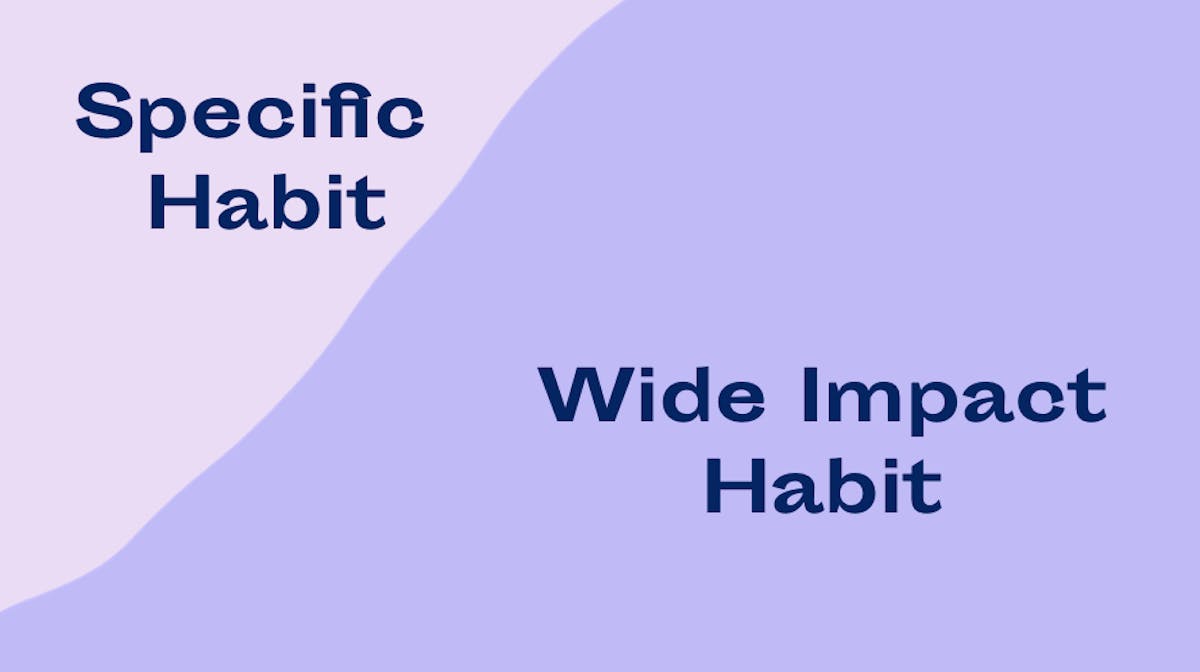In today’s work environment, we must meet all sorts of expectations and deadlines, be constantly ahead of the game, excel in leadership, and at the same time be innovative and agile. And if you don’t have an environment where people feel safe to; be themselves, share their opinions, disagree with each other, and take risks, it’s very hard to achieve any of those things.

Why you should focus on Wide Impact Habits
When people join The 1-Month Habit Experiment, they often ask what habits to focus on for maximum effect. I shy away from recommending specific habits since it’s so individual. Instead, we start by exploring who you wish to be, your values, strengths, and strong held beliefs to help each one find something that’s right for them.
But if I would give any recommendation, it would be to focus on wide impact habits rather than specific ones. Meaning habits that don’t just impact one area of your life, but many at the same time.

Specific habits
A specific habit like saving a bit each day will improve your economy.
Writing a bit each day will improve your writing.
Stretching will make you more flexible and help you avoid injuries.
All great things. And depending on your situation, that might be what you need at the moment.
Wide impact habits
Wide impact habits, however, will impact many areas of your life, they just might not be as sexy as those specific ones as you soon will learn. So what are examples of some wide impact habits?

A gratitude journal is a simple way to practice gratitude by writing down and remember things you are grateful for each day.
Practicing gratitude daily, research shows will make you enjoy your friends, family and colleagues more. You might notice that you value your stuff more and don’t feel a need to buy new stuff. It will make you generous and honest. It will increase your willpower and foster cooperation. There are also studies showing how gratitude enhances productivity. (In this article you can learn more about the scientific studies supporting these claims. If you want to learn more about what impact gratitude can have on your life, this podcast episode gets into it. It blew me away.)
Practicing compassion daily will very likely make you a better leader and a better listener. It will strengthen your immune system, normalize your blood pressure, lower your stress and depression, improve your physical recovery from illness, and even extend your lifespan. It will deepen your connection with the people you care about. It will increase your willpower to make decisions benefiting the greater good. (source)
Practicing long-term thinking will most definitely improve your quality of life in the future. It will increase your chances to have higher SAT scores and better grades and make you less likely to get obsessed and protect you from illness and injury. It will have a positive impact on your finances. You will be better at managing stress and be better at focusing. It will improve your decision-making skills. Make you a better parent and you will be more likely to have successful children. And of course, increase your willpower (see the pattern here?). (Source)
Conclusion - Not sexy, but the right thing to do in most cases.
So by building one of those habits, you can get a bunch of powerful benefits. The problem, however, is that none of these practices will deliver quick results, but rather impact you greatly further down the line, like with most things worth our time. And maybe that makes them less attractive to some people (maybe some of us could benefit from practicing long-term thinking!). But focusing on wide impact habits is clearly the smarter thing to do.
So the next time you are about to implement a new routine, change or habit ask yourself, is this a specific habit or a wide impact habit? And if it’s a specific habit, ask yourself is there a wide impact habit that would deliver the results I hope for plus a bunch of other great things as well?
Need support implementing habits?
Join The 1-Month Habit Experiment to learn the life-essential skill together with others.

